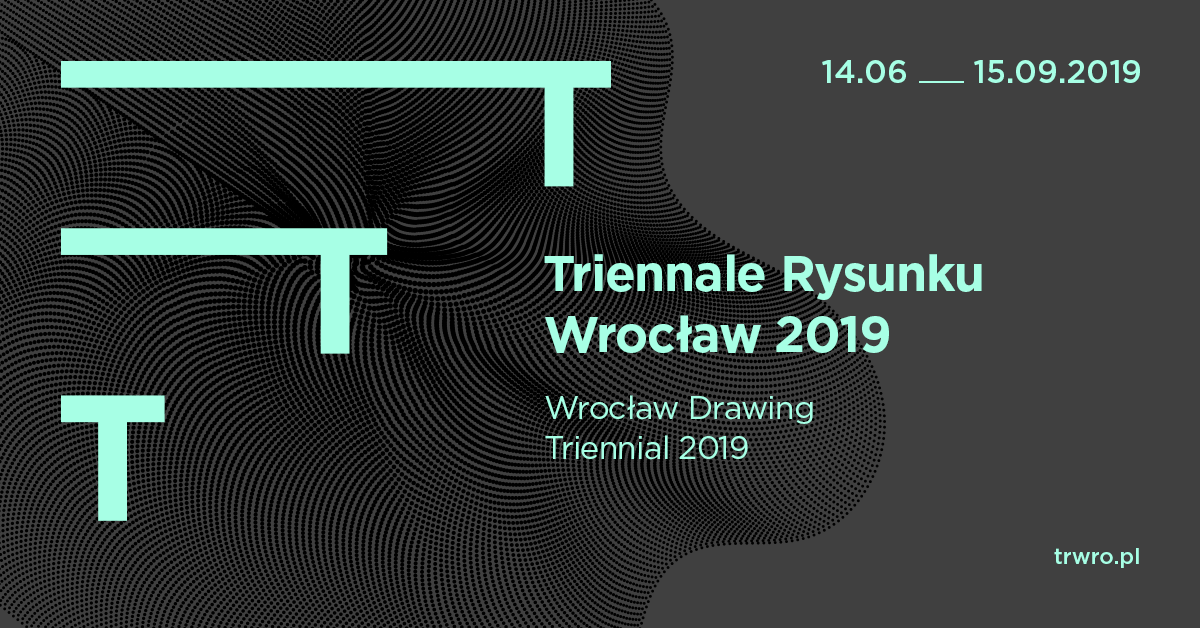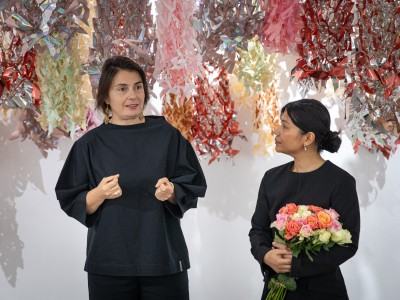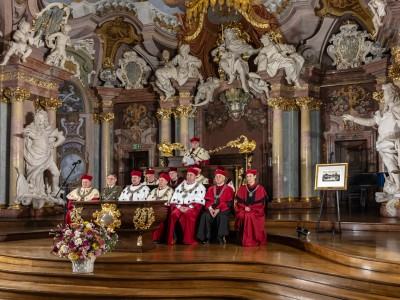
14.06 – 15.09.2019
Weltschmerz
14.06 – 18.07.2019
opening: 14.06.2019, 6 pm
location: Galeria BWA Wrocław Główny, ul. Piłsudskiego 10
Weltschmerz is the motto of this year's edition of the Open Call organized as part of Wrocław Drawing Triennial 2019 and it is also the title of the exhibition featuring the best submissions. The term was coined at end of Romanticism and its relevance is confirmed by thousands of instances it is referred to in contemporary culture. Over the ages, a lot has changed, yet the vast majority of those who benefit from the clash of the prosocial projects advocating freedom with the ruthless reality is still political and financial elites.
The artists who show their artworks in the halls of BWA Wrocław Główny explore various themes and contexts, examining their relationships with the world and losing once again their fragile stability. It is going to be interesting to see how they describe and revise the focal term. Will they manifest their lack of faith in their ability to influence the contemporary world and their own lot, their feeling of alienation and endless sadness? Or will they distance themselves from sentimental visions, which are so alien to the current generation? What idea to overcome hopelessness and dissatisfaction will they find?
At the exhibition in the halls of BWA Wrocław Główny, we will see almost sixty artworks representing various artistic strategies in the field of the broadly-understood definition of drawing. Some of them are classical drawings on paper, others exemplify the thinking through drawing idea realised in digital media. We will also see art objects and performances. The goal of the Triennial organizers is to show the audience the widest possible overview of the most interesting drawing practices and strategies and the current trends in contemporary drawing and modern art.
curator: Patrycja Sap
artyści: Paweł Baśnik, Marta Bełkot, Lasma Bringina, Piotr Bzdęga, Czesław Chwiszczuk, Tomasz Dobiszewski, Monika Drożyńska, Łukasz Gierlak, Dejan Grba, Grupa Amen, Marek Grzyb, Jerzy Hejnowicz, Michał Jakubowicz, Živilė Jasutytė, Anna Juszczak, Bartek Arobal Kociemba, Mateusz Kokot, Piotr Kopik, Jerzy Kosałka, Julia Królikowska, Ewa Kulesza, Dominik Litwin, Izabela Łęska, Weronika Michalska, Anita Mikas, Jan Mioduszewski, Daisuke Nishijima, not a Number, Adam Nowaczyk, Anna Orbaczewska-Niedzielska, Magdalena Parfieniuk, Mariya Pavlenko, Katarzyna Piątek, Michał Pietrzak, Paulina Poczęta, Dominik Podsiadły, Hanna Rozpara, Irmina Rusicka & Kasper Lecnim, Magdalena Sadłowska, Jędrzej Sierpiński, Piotr Skowron, Jakub Słomkowski, Jarosław Słomski, Justyna Smoleń, Aleksandra Sojak-Borodo, Radosław Szlęzak, Olga Śliwa, Iga Świeściak, Artur Tajber, Bogdan Topor, Sebastian Trzoska, Michalina Wawrzyczek-Klasik, Andrzej Wieteszka, Jack Williams, Katarzyna Wójcicka, Martyna Zaradkiewicz, Olga Ząbroń, Piotr Żaczek
Borderline
14.06–15.09.2019
exhibition organised as part of Wrocław Drawing Triennial 2019
Wrocław Contemporary Museum
artists: Nils Atallah, Wojciech Bąkowski, Piotr Bosacki, Joaquín Cociña, Krzysztof Gil, Zofia Gramz, Agnieszka Grodzińska, Juliana Höschlová, Kornel Janczy, Bartek Kiełbowicz, Łukasz Korolkiewicz, Jarosław Kozłowski, Cristóbal León, Róża Litwa, Jacek Markiewicz, Magda Moskwa, Zbigniew Rogalski, Irmina Rusicka & Kasper Lecnim, Michał Slezkin, Bartosz Zaskórski
exhibition arrangement: Fabien Lede
curator: Stach Szabłowski
The Borderline exhibition focuses on an imaginary, speculative and creative aspect of drawing. It features some drawing practices which serve to depict that which an artist either cannot or does want to see directly and also which is not and was not, although which eventually may be.
The term borderline denotes a personality disorder, which, according to psychiatrists, belongs somewhere between neurosis and psychosis.
Borderline is a fairly recent disorder, yet it is more and more often diagnosed, especially in the so-called developed societies and it begins to take on pandemic proportions.
Is it just the case of more rigid diagnosis criteria? Or should we rather look for the aetiology of borderline in the current social order and the late postmodern civilisation? The cognitive crisis caused by the surplus of information and the impossibility to verify it, capitalist competition, the fast pace of change, conspiracy theories and catastrophic moods – they are all part of the culture which itself seems to manifest borderline personality traits.
The term borderline, which besides a personality disorder may evoke a basic drawing figure, a line defining a boundary between drawing and not-drawing, is a metaphor of an artistic, emotional and social situation.
Following in the directions set by the artists who take part in the Borderline exhibition, the audience will take three paths, which are the leading themes of the exhibition.
The first one concerns the question about the potential of drawing which is disconnected from the direct relation with the outside world with regard to the artist's awareness.
The second one relates to the use of thus understood practices, seemingly reversed/severed from reality, as alternative tools of cognition – an exploration of individual phantasms, impressions, affects and fears.
The third theme addresses the problem of translating a personal dimension of the showcased drawing activities into the sphere of collective life, i.e. a question about the nature of the relationship between reflection and imagination in drawing and the emotional, existential and political condition of modern society.
*
The framework for drawing gestures showcased at the Borderline exhibition is an air-raid shelter dating back to the second world war. Monumental on the outside and claustrophobic on the inside, today it houses Wrocław Contemporary Museum. Its windowless armoured walls were built to protect those who enter inside. As a result, both the artworks showcased at the exhibition and the audience find themselves isolated from the outside world. In the context of the exhibition, the bunker sheltering its exhibits is not only a background narrative but also a metaphorical element – a dialectic figure denoting refuge and isolation, safety and oppression, an autonomous microcosmos and a besieged fortress. Inside its walls, meditation takes place, a reflection on drawing understood as a mode of thinking, conjuring things up and making them up. Perhaps there is no world behind the walls of the museum or, on the contrary, there is one but in a completely different form than we have known so far. Perhaps it needs to be drawn again.
trwro.pl
muzeumwspolczesne.pl
Draftsmen's Congress / Forgiveness Holiday. Paweł Althamer
21 – 23.06.2019 (Drawing activities)
location: Awangarda BWA Wrocław, ul. Wita Stwosza 32
The exhibition will be on show in the gallery windows of Awangarda BWA Wrocław until the end of July.
Draftsmen's Congress, run by Paweł Althamer, is one of the most important events in this edition of Wrocław Drawing Triennial 2019. The invited artists will share their views on a place of culture in the contemporary world and its facilitative role in interpersonal communication. The three-day congress will be crowned by the ceremony of forgiveness.
curator: Paweł Jarodzki
Un-Home / Moving Stones. Filip Berte
14.06 – 5.07.2019
opening: 14.06.2019, 16:00
location: Galeria Arttrakt, ul. Ofiar Oświęcimskich 1/1
A solo exhibition of the winner of the open call contest which was organised as part of the previous edition of Wrocław Drawing Triennial 2019. In his projects, Filip Berte focuses on cultural identity, exclusion and the burning refugee problem in Europe. The artist will invite refugees to collaborate with him on the project.
curator: Daniela Tagowska
In Dissaray
27.06 – 26.07.2019
opening: 27.06.2019, 18:00
location: Galeria Entropia, ul. Rzeźnicza 4
Six Wrocław artists will collaborate on a joint rhizomatic drawing, made on the walls and floor of the Entropia gallery while retaining an existing drawing, created by life itself. Their drawing will expand and transform into an installation. The artists will use their own techniques, e.g. sidoluxography, which they employed on the occasion of their previous group exhibition in Entropia.
artists: Mira Boczniowicz, Julita Gielzak, Bożena Grzyb-Jarodzka, Alicja Jodko, Magda Migacz, Beata Rojek
idea / coordination: Alicja Jodko
exhibition production: Galeria Entropia
ANIMACJA PROGRAMME
14.06 – 18.07.2019
The programme of Wrocław Drawing Triennial 2019 includes two animation shows: "Narration" and "Abstraction", screened alternately, as well as several-days-long workshops and a show given by an Australian by birth, independent artist and film-maker Karel Doing, who will present his own animation techniques.
curators: Maciej Bączyk, Aga Jarząb, Piotr Kardas
for more information visit: trwro.pl




